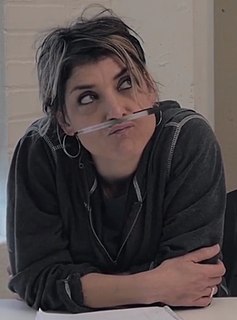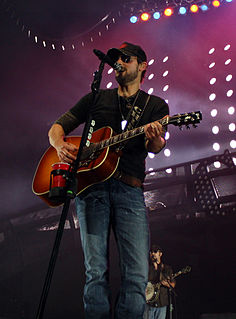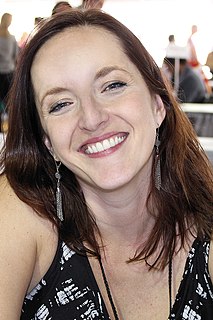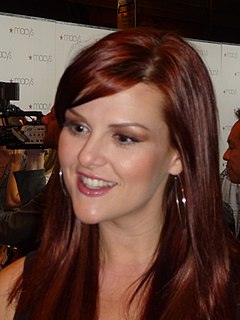A Quote by Tim Hecker
There's a limit of any form of representation; it's the same about writing about visual art. I still think it's useful for people to think through things in a deeper way, and use adjectives even if they're not sufficient, you know? I always find it interesting what terms they use to refer to the work. It's always different, and that's kind of intriguing. Sometimes it's clichés, but often it's really creative ways of paraphrasing or reformatting what to mean seems something else. I like that, personally.
Quote Topics
About
Adjectives
Always
Any
Art
Creative
Deeper
Different
Else
Even
Find
Form
Interesting
Intriguing
Kind
Know
Like
Limit
Mean
Often
Paraphrasing
People
Personally
Really
Refer
Representation
Same
Seems
Something
Something Else
Sometimes
Still
Sufficient
Terms
Things
Think
Through
Use
Useful
Visual
Visual Art
Way
Ways
Work
Writing
Related Quotes
I get so much energy and I learn so much through collaborating with other people. Ultimately, I think the best music will always be created through collaborations - pooling together skills to create something bigger than any individual. I like to use my own SOPHIE material to present ideas in their most extreme, un-compromised form. I really use those opportunities to express exactly where I'm at in terms of production and writing ideas, as a document of my thoughts and feelings, as well.
I think, for me specifically when it comes to music, I don't think that I need any persuading to think about it. It's always kind of in the back of your mind and - but I think it's part of who I am and always will be, I mean, in a very cellular way. When you grow up doing, you know, one thing, I think you get to this place where you want to try new things. And I do think that we live in the type of world where people get comfortable with you in one way, and so seeing you in a different way, it takes some time.
We're living history all the time, in the papers, in the news, you think about stuff and it goes into your brain and you think about it and it comes out somehow. You have an idea; you've heard a phrase, or you're angry, or something disturbs you, or something seems paradoxical to you, you explore that idea, much like a writer would explore maybe an idea through metaphor. Maybe artists use their vehicle to explore ideas, so I think the things that interest me are the kind of idea of continuous change and how nothing stays the same and it's always disintegrating into something more.
I think subjectivity plays into everything. It's unavoidable; you couldn't avoid it if you tried. I think, potentially, a lot more commercial movies, it seems to be that the people making the films are trying to elicit the same reaction. I think a lot of the most interesting work in art and in films are often kind of polarized opinions and affect people in very different ways, which may be less successful commercially, but they elicit a dialogue that's quite interesting.
Often when people are claiming that they are not creative, they mean that they are not artists, writers, athletes, or any other media types demonstrating creativity. Or they know someone who always seems to have a lot of ideas and know that they can't match that. We all have a tendency to idolize those who create what we see in the media. I think it's better to use these people as models rather than idols, especially when these people have aspects of their lives that are similar to us. Then we can take their inspiration as we go on to be creative in our own way in our own lives.
I think a lot of the writing, you know, I write is just kind of like that where, you know. I write exactly how I'm feeling sometimes, and hardships that I'm going through. But I always end up, like the choruses are like, "God, You are good. God, you're faithful. You know, I know You understand, You're right here by my side." All these different things. And I just say very personal experiences that I've been through. I mean, it's not always detrimental thing.
I think if you're a creative person, then you're always kinda looking to move things along - 'Where else can I go? Where can I take this?' From painters to photographers - anything creative in the arts - if you're a true artist, I think you'll always look to do something else. 'Where else can I go with it?' Do you know what I mean?
For one thing, I don't think art needs to be about suffering; sometimes it really seems like it's only the art about pain that is interpreted as profound, and in my work for years I've really tried to deal with subjects that are substantial, not just fluffy, but presented in a more playful, approachable kind of way.
There have been times when I'm writing about things that are personally embarrassing. Like any human being, sometimes I can't help but wonder - 'What are the people I know going to think about this?' So I have to remind myself that all is permissible. Art has to be a free space. Language has to be a free space.
I don't always know what's going to go on in terms of the mood of the story. Sometimes I start with the mood, but sometimes I just try to work toward discovering it. But I do think often there's a mood or unsettling quality, in which the reality of the world seems to be taken away, that I really love, and it's something that I almost always unconsciously move toward.
My sister's a musician. Everyone else in our family, it's either academics or artists of one kind or another. And those are the people that I think I like to hang out with, too. I think, you know, they're always interesting; they lead interesting lives, and I think they're important for everyone to read about because everyone is an artist in a way.
I think it worked two ways. One, a lot of people writing about the movie used that as shorthand and it could either be a good thing or they could use it to dismiss the movie like we were a copycat movie or something like that. It's very much its own story. It is a young woman in a post-apocalyptic society, but after that it's just a whole different kind of story and a different journey that she goes through.
I don't want to be hubristic about art's possibilities. I don't think that art has a causal relationship to revolution. I do think it's a way people coordinate or orient their own often-inchoate experiences, sometimes willfully. With "The Masque of Anarchy," one of the things I note is that many political movements over time have made use of it as a way to orient themselves and to narrate what they were doing.




































